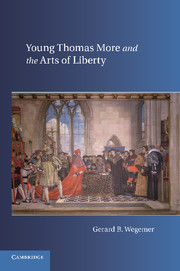Book contents
- Frontmatter
- Contents
- List of Illustrations
- Acknowledgments
- List of Abbreviations
- 1 Young Thomas More
- 2 Fashioning Peace and Prosperity
- 3 Cicero's and More's First Citizens
- 4 More's Earliest Views of Humanitas, Libertas, and Respublica, 1500–1506
- 5 More's Life of Pico della Mirandola (c. 1504–1507)
- 6 More's 1509 Coronation Ode
- 7 Political Poems of 1509–1516
- 8 Richard III
- 9 Utopia
- 10 The Un-Utopian Thomas More Family Portrait
- 11 The Arts of Liberty
- Works Cited
- Index
8 - Richard III
Diagnosing the Causes of England's Plague of Civil War
Published online by Cambridge University Press: 25 October 2011
- Frontmatter
- Contents
- List of Illustrations
- Acknowledgments
- List of Abbreviations
- 1 Young Thomas More
- 2 Fashioning Peace and Prosperity
- 3 Cicero's and More's First Citizens
- 4 More's Earliest Views of Humanitas, Libertas, and Respublica, 1500–1506
- 5 More's Life of Pico della Mirandola (c. 1504–1507)
- 6 More's 1509 Coronation Ode
- 7 Political Poems of 1509–1516
- 8 Richard III
- 9 Utopia
- 10 The Un-Utopian Thomas More Family Portrait
- 11 The Arts of Liberty
- Works Cited
- Index
Summary
[W]ell aware of the old vying factions at court (factions that he had even done all that he could to foment), … [Richard] supposed it would further his plans a great deal if he secretly served his own interests under a pretext of partisanship.
Thomas More, Historia Richardi Tertii 328/10–12, 14–15If I as a private citizen [priuato] had been able to foresee and anticipate [this wicked ardor for glory's] ill effects …, I would never have sacrificed so many men's heads to see men on their knees doing me honor.
Thomas More, Historia Richardi Tertii 334/22–24When everyone tries to ingratiate his own faction with the prince, the result is that his favor, more than truth and expediency [vero atque vtili], determines how people advise him: and thus … drag the kingdom to ruin.
Thomas More, Historia Richardi Tertii 332/9–12On his deathbed, King Edward IV comes to recognize the extreme danger of factions as well as his own misguided choice that heightened those factions. Before recounting this classic deathbed speech with its dramatic revelations, the narrator of Historia Richardi Tertii gives a rare endorsement of what Edward will reveal:
[T]hough [King Edward IV] feared nothing less than what actually happened, he foresaw that the dissension of [his sons'] friends could do them great harm, since their naturally frail and improvident youth would be stripped on its one source of strength, their friends' counsel [consiliis]. For when dissension and discord polarized the supporters, they would pay more attention to partisan interests than to stating the truth, and would advise what was pleasant, and not what was profitable, in order to advance their own faction in the favor of the prince.
- Type
- Chapter
- Information
- Young Thomas More and the Arts of Liberty , pp. 119 - 138Publisher: Cambridge University PressPrint publication year: 2011



